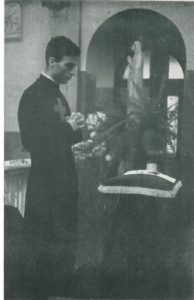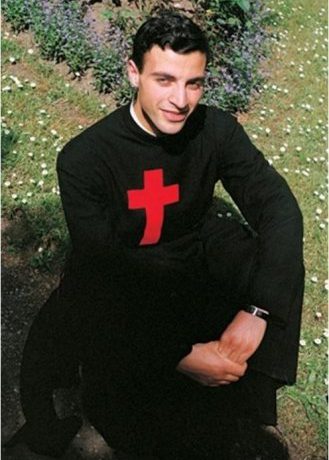 When on 12 June 1964 the young Camillian student Nicola D’Onofrio closed his eyes to this earth to return to the ‘House of the Father’, cut down at the age of only twenty-one by an illness that does not forgive, many people believed that a life that was so rich in great promise, and had already offered signs of profound spirituality, one day would certainly lead to the declaration, pronounced by Pope Francis, that he had heroically lived the ‘Christian Virtues’!
When on 12 June 1964 the young Camillian student Nicola D’Onofrio closed his eyes to this earth to return to the ‘House of the Father’, cut down at the age of only twenty-one by an illness that does not forgive, many people believed that a life that was so rich in great promise, and had already offered signs of profound spirituality, one day would certainly lead to the declaration, pronounced by Pope Francis, that he had heroically lived the ‘Christian Virtues’!
Model and Champion
Nicola D’Onofrio, a young man from Abruzzi, passed the Process of Information on his fame of holiness which had begun at the end of the Jubilee Year of Redemption (1984) in the context of the apostolic letter Salvifici Doloris of Pope Saint John Paul II on the suffering of man, a process that illuminated him as an exemplary champion of that human suffering which was made sublime by the Son of God on the Cross. Nicolino suffered for a long time during his life, and not only physically. The moment of the first impact of the truth of his situation generated in him a pain of the soul that was such as to destroy a man before this could be done by a physical malady. He was versed in the ‘Theology of the Cross’. From his writings emerges what he had absorbed from those who had spoken to him about the Crucified Christ, grafting into him the vital lymph that comes down from the Mother of Christ, from St. Camillus, and from St. Therese of the Child Jesus. We ‘read this anew’ in the discourse of Salvifici Doloris on the participation of man in the ‘Redemptive Suffering of Christ’. Pope St. John Paul II begins with the Apostle Paul who in entering the mystery of suffering writes: ‘“In my flesh I complete what is lacking in Christ’s afflictions for the sake of his body, that is, the Church”… The Redeemer suffered in place of man and for man. Every man has his own share in the Redemption’.
He Transported us with his Prayer
A wonderful life project where only love can give a coherent response to this call. Nicolino experienced this dimension. In the preface to the first biographical profile of him we read: ‘Nicola died loving. “Jesus I love you. Mary I love you, St. Therese how much I love you”. These were the words of his agony. To love at the age of twenty is normal but the love of Nicola was also prayer. And when love prays, what cannot be achieved? One manages to live in a sincere, pure, generous way, always smiling, even with lung cancer’. The medical doctor who had treated him since the first signs of his malady, and who followed him step by step until his last moments, provided the following testimony at the canonical process: ‘In the last hours when his eyes were semi-closed, he transported us with his prayer; breathless, tired out, in pain, he prayed, he prayed, and those of us who surrounded him prayed with him, transported by him…we prayed with him and for him, at times in a low voice, and at times out loud so that he would feel that we were with him during that most grave and most intense hour…when between one breath and another the intervals became dramatic, and also after his last breath, all of us went on praying; our prayers were for Nicola a bridge to pass over from his short earthly life to eternity. And he passed away leaving his legacy: praying to live, praying to die’.
From his Writings
A rapid survey of some of his writings displays the crystalline image of this Venerable Servant of God who out of love accepted the invitation of St. Paul: ‘I have been crucified with Christ; it is no longer I who live, but Christ who lives in me’ (Gal 2:20).
‘God has loved, and loves, all men with an intense love. But in a special way He loves those whom He has called to be His ministers. Therefore, I have been loved by Jesus with a special love…God chose me because He loved me so much, because He wanted this; nothing else remains but to kneel down and thank him for His love…God called me as He called Matthew, Peter, James…and I, like them, have followed the Teacher. The goodness of God! What immense love Jesus has had for me! How will I return this love?’
 ‘I offer up my life to Jesus for the salvation of very many souls, but especially the souls of my earthly family so that it can live in an increasingly holy way, so that we may all then meet again in heaven’.
‘I offer up my life to Jesus for the salvation of very many souls, but especially the souls of my earthly family so that it can live in an increasingly holy way, so that we may all then meet again in heaven’.
‘There is no point in repeating that it is beautiful to love God: one has to demonstrate this through one’s works. Jesus, I feel something that I do not know how to express to you: I want to love you, I want to make you love!’
‘The whole of the life of Christ was a cross and martyrdom. And what do I want? To be a lord? No, no! I want to suffer a great deal for love of Jesus and Mary’.
At Lourdes and Lisieux
In early May, a month before his death, his Superiors sent him to Lourdes, in the hope of a miracle. A Camillian religious when saying goodbye said: “Over the next few days all of us will pray for you”. Nicolino thanked him and answered: “Yes, pray, pray…not for my healing, but that I may do the will of God”.
From Lisieux, on 16 May, twenty-eight days before he died, in his last letter to his parents he wrote: ‘It is true that I am not feeling that bad, but I would like to be very well. For that matter, however, nobody knows the will of God, and we must always be ready to carry it out even if it is something that is difficult and burdensome. I am very happy be able to suffer a little now when I am young because these are the finest years to offer up something to the Lord. Beloved parents, please pray, as well, to the Lord that he may restore me to health so that I can become a priest and work a great deal more for souls. If the good Lord, however, wants something different to our wishes, blessed be the Lord: He knows what He is doing and what is best for us! There is no point, we cannot know these things – only God knows them’.
He Lived with Love
Such was Nicolino d’Onofrio, about whom the Church said, with recognition, ‘that he lived his life heroically with love and for love of his and our God’.
Now we await from heaven a ‘sign of holiness’ so as to be able to pray to him and venerate him as ‘Blessed’. We ask a prayer from everyone and the offering up of their sufferings so that God may exalt him and propose him as a ‘champion’ because he knew how to make ordinary daily life a direct ladder to God, uniting his personal suffering to the suffering of the Crucified Christ for the Redemption of the world.















Camillians on Facebook
Camillians on Twitter
Camillians on Instagram